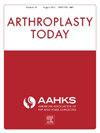Ascorbic Acid Reduces the Blood Boss After Total Knee Arthroplasty: Insights From a Randomized Controlled Trial
IF 1.5
Q3 ORTHOPEDICS
引用次数: 0
Abstract
Background
Blood loss is among the main complications of total knee arthroplasty (TKA) and oxidative stress, and hemolysis caused by reactive oxygen species are one of the causes of hemoglobin (Hb) drop. Ascorbic acid is a potent antioxidant that can protect against reactive oxygen species. In this study, we aim to explore the antioxidant effect of ascorbic acid on blood loss and patient-reported outcomes following outpatient TKA.
Methods
Patients scheduled for outpatient primary TKA were enrolled in this randomized, double-blind clinical trial and were assigned to 1 of the 2 groups. The patients in the ascorbic acid group received intravenous vitamin C perioperatively. Patients in the placebo group received only normal saline. We calculated the blood loss using the Hb drop. Patient-reported outcomes such as Oxford Knee Score, Western Ontario and McMaster Universities Osteoarthritis Index, Knee Injury and Osteoarthritis Outcome Score, and Forgotten Joint Score were used to evaluate the postoperative pain and function in the 6-month follow-up.
Results
The patients who have received ascorbic acid had lower Hb drop (g/dL) (1.30 ± 0.72 vs 1.91 ± 0.84, P value < .001) and total blood loss in the first postoperative day (463.60 ± 274.37 vs 732.11 ± 347.78, P value < .001). Also, fewer patients reached the minimum clinically important difference level for Hb drop in the ascorbic acid group. The patients’ postoperative functional and pain scores were not different between the 2 groups.
Conclusions
Our findings demonstrated that perioperative use of ascorbic acid can reduce blood loss by nearly 36% on the first postoperative day and should be considered as an effective blood-preserving agent in conjunction with tranexamic acid during TKA.
求助全文
约1分钟内获得全文
求助全文
来源期刊

Arthroplasty Today
Medicine-Surgery
CiteScore
2.90
自引率
0.00%
发文量
258
审稿时长
40 weeks
期刊介绍:
Arthroplasty Today is a companion journal to the Journal of Arthroplasty. The journal Arthroplasty Today brings together the clinical and scientific foundations for joint replacement of the hip and knee in an open-access, online format. Arthroplasty Today solicits manuscripts of the highest quality from all areas of scientific endeavor that relate to joint replacement or the treatment of its complications, including those dealing with patient outcomes, economic and policy issues, prosthetic design, biomechanics, biomaterials, and biologic response to arthroplasty. The journal focuses on case reports. It is the purpose of Arthroplasty Today to present material to practicing orthopaedic surgeons that will keep them abreast of developments in the field, prove useful in the care of patients, and aid in understanding the scientific foundation of this subspecialty area of joint replacement. The international members of the Editorial Board provide a worldwide perspective for the journal''s area of interest. Their participation ensures that each issue of Arthroplasty Today provides the reader with timely, peer-reviewed articles of the highest quality.
 求助内容:
求助内容: 应助结果提醒方式:
应助结果提醒方式:


